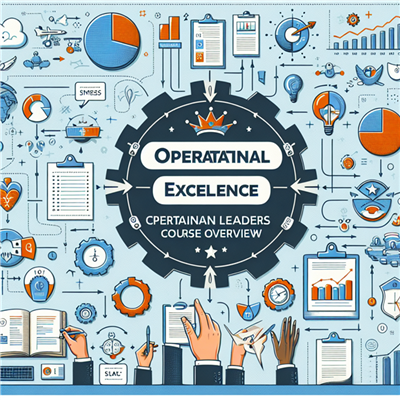
In today's competitive corporate world, the path to the C-suite is increasingly challenging. For ambitious professionals aiming for these top positions, it's essential to stand out from the crowd. One way to achieve this is through an Executive Management Certification.
Climbing the corporate ladder to reach the C-suite is no easy task. The positions of CEO, CFO, COO, and other executive roles demand more than just technical skills; they require leadership abilities, strategic thinking, and a broad understanding of how businesses operate across departments. In today’s competitive landscape, an executive management certification has emerged as a powerful tool for aspiring C-suite leaders to gain the necessary edge and differentiate themselves from their peers.
The Role of Executive Certifications in Preparing for C-Suite Positions
Executive certifications provide a structured pathway for leaders to acquire advanced knowledge, sharpen critical decision-making skills, and understand the complexities of corporate governance. They focus on areas like strategic leadership, financial acumen, risk management, digital transformation, and more—core skills essential for thriving in a C-suite role.
1. Building Strategic Leadership Skills
Strategic leadership is one of the most vital competencies for anyone aiming to enter the C-suite. In contrast to mid-level management, where the focus is often on tactical execution, executives are responsible for defining and steering the long-term vision of the company. Certifications such as the MIT Sloan Executive Certificate in Management and Leadership or the Harvard Business School Executive Education programs emphasize high-level strategic thinking. These programs help candidates hone their ability to navigate complex challenges, identify growth opportunities, and develop actionable strategies to lead their organizations forward.
2. Enhancing Financial Acumen
Financial literacy is another cornerstone for C-suite roles, particularly for CFO and CEO positions. Executives must interpret financial reports, understand economic conditions, and make investment decisions that align with company goals. Executive certifications like the Certified Management Executive (CME) or Stanford’s Advanced Management Program include courses on corporate finance, budgeting, and risk management to ensure that future C-suite leaders are well-prepared to oversee financial matters.
Moreover, CFO-specific certifications such as the Chartered Financial Analyst (CFA) or Certified Financial Planner (CFP) provide in-depth expertise in managing corporate finance, risk, and financial planning—skills that are critical for CFOs who need to deliver results to shareholders and board members.
3. Leadership in a Digital Age
In today’s fast-paced digital economy, executives need to be equipped with the latest technological insights. Certifications focusing on digital leadership, such as the Digital Transformation Strategy by INSEAD, help leaders navigate the rapidly changing technological landscape. These programs focus on how to leverage AI, big data, and other technologies to drive innovation and efficiency, a critical skill set for C-suite executives.
As digital disruption reshapes industries, C-suite aspirants must be fluent in tech-driven strategies to lead organizations into the future. Such certifications ensure executives are not just followers of trends but drivers of digital transformation.
4. Risk Management and Crisis Leadership
C-suite executives must also manage risks and respond to crises effectively. Certification programs like the Crisis Leadership Program from the Institute of Executive Management focus on preparing leaders for high-stakes decision-making under pressure. These programs explore how to anticipate risks, navigate crises, and protect the company’s reputation—crucial abilities for C-suite leaders who must make quick decisions that can significantly impact the business.
5. Corporate Governance and Ethical Leadership
C-suite leaders bear significant responsibility for ensuring that their organizations follow ethical practices and comply with regulatory frameworks. Certifications such as the Corporate Governance Executive Education from Wharton focus on ethical leadership, corporate governance, and stakeholder engagement. These programs prepare executives to balance the interests of various stakeholders, from shareholders to employees, and navigate ethical dilemmas while maintaining transparency and accountability.
How Certifications Can Differentiate You in a Competitive Job Market
The executive job market is fiercely competitive, with many highly skilled professionals vying for a limited number of top-level positions. Holding a recognized certification can set you apart from other candidates by demonstrating your commitment to leadership development and ongoing learning. Here’s how:
1. Demonstrates Commitment to Professional Growth
Earning an executive management certification requires a significant investment of time, money, and effort. Employers view certified candidates as committed, disciplined, and proactive in their career development. This willingness to continually learn and adapt is particularly important for C-suite roles, where leaders must navigate complex and evolving challenges. Certifications signal to employers that you are serious about leading and prepared for the responsibilities of executive leadership.
2. Validates Core Competencies
Certifications serve as tangible evidence of your expertise in key areas. Whether it’s financial management, digital transformation, or risk assessment, executive certifications validate that you possess the necessary skills to perform at the highest level. This is particularly useful when applying for C-suite positions where specific skills—such as advanced strategic thinking or crisis management—are crucial. Certifications are a way to prove your competency in these critical areas.
3. Broadens Your Professional Network
Many executive certification programs are attended by seasoned professionals from various industries. Participating in these programs provides the opportunity to network with influential executives, business leaders, and industry experts. These connections can be invaluable in advancing your career, offering insights, mentorship, and potential job opportunities. Having a strong network of C-suite peers can provide access to industry trends, best practices, and even boardroom-level opportunities.
4. Provides a Global Perspective
Certifications from internationally recognized institutions expose you to global business trends and perspectives. In today’s interconnected world, executives must understand global markets and possess cross-cultural leadership skills. Programs such as the Global Executive MBA (GEMBA) or certifications from global institutions like INSEAD or Wharton provide a broader perspective on international business, preparing you to lead on a global stage.
Real-Life Success Stories of Executives Who Benefited from Certification Programs
1. Sheryl Sandberg (Facebook COO)
Sheryl Sandberg’s journey to becoming Facebook’s COO is well-documented, and her commitment to leadership education played a crucial role in her success. Before joining Facebook, Sandberg participated in executive training at Harvard Business School, where she earned an MBA. Her leadership acumen, strategic thinking, and financial expertise helped her guide Facebook through its IPO and make it one of the most successful tech companies in the world.
2. Satya Nadella (Microsoft CEO)
Satya Nadella’s rise to the top of Microsoft is a prime example of how continuous learning and executive education can lead to career success. Before becoming CEO, Nadella completed the Master of Business Administration (MBA) from The University of Chicago Booth School of Business, focusing on corporate strategy, leadership, and economics. His strong leadership during Microsoft’s transition to cloud computing underscores the importance of executive education in navigating technology-driven change.
3. Mary Barra (General Motors CEO)
Mary Barra, the first female CEO of General Motors, attributes much of her success to her education, including her time at Stanford University’s Graduate School of Business where she earned a degree in executive management. Her strong focus on leadership and operations management has helped transform GM into a more agile and innovative company, particularly in its pursuit of electric vehicle technology.
Choosing the Right Executive Management Certification
With numerous certifications available, it's crucial to choose a program that aligns with your career goals. Koenig Solutions, a leading IT training company, offers a range of Executive Management Courses to cater to the diverse needs of professionals.
As the corporate world continues to evolve, the importance of an Executive Management Certification for aspiring C-suite professionals cannot be overstated. It not only enhances your skills but also prepares you for the challenges of top-level management roles. With Koenig Solutions, you can embark on your journey to the C-suite armed with the right knowledge and skills.
Conclusion
Executive management certifications are no longer just a "nice-to-have" for C-suite aspirants—they are essential. From building leadership and financial skills to gaining global business perspectives, these certifications prepare aspiring executives for the challenges and responsibilities of leading in today’s complex business environment. In a competitive job market, they set you apart, validate your expertise, and signal your commitment to professional growth. By investing in executive certifications, you can significantly enhance your chances of landing a coveted C-suite position and drive your career to new heights.







COMMENT